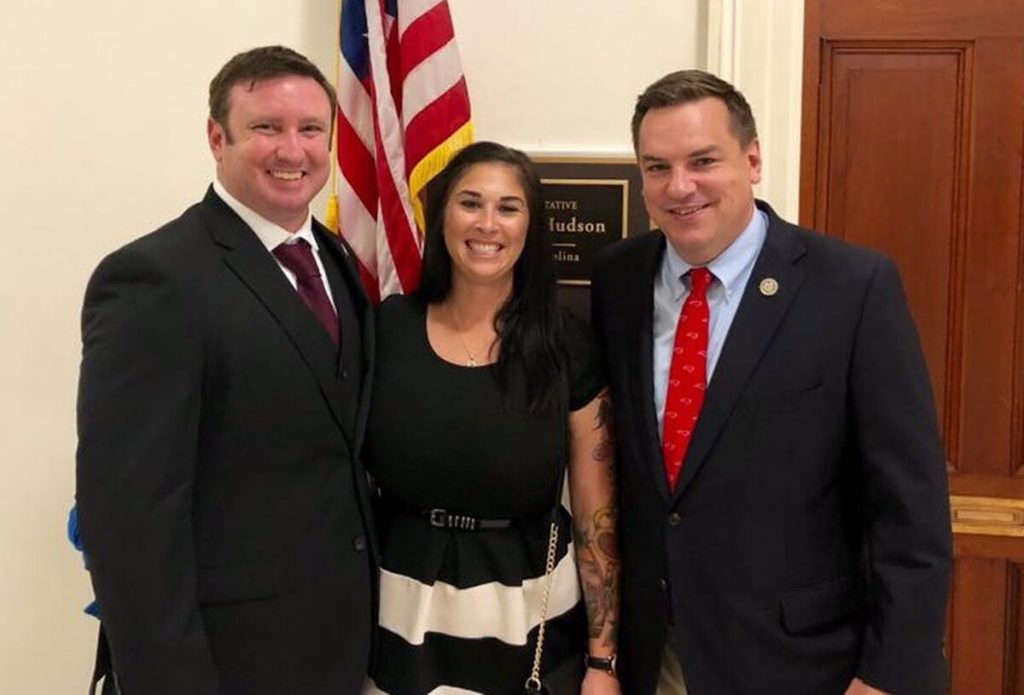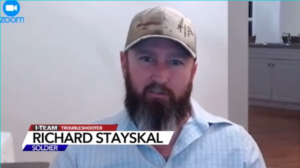A friend had arranged a quick meeting with President Trump before he went on stage at a rally in Greenville, North Carolina, he said, and it was his moment to take his fight from Capitol Hill to the White House.
It’s called the Sergeant First Class Richard Stayskal Military Medical Accountability Act of 2019, the soldier told the president. Trump asked him to repeat the name, then repeated it back to the soldier.
“If he said those words back to you, he’s definitely going to take a look into it,” Vice President Mike Pence told Stayskal later, Stayskal said, as they chatted at the rally.
A week ago, the House passed its version of the 2020 National Defense Authorization Act, and with it, that piece of legislation named after him. Now it needs the Senate’s vote and the president’s signature to become a law.
“In general, I think, it’s hard not to be receptive to it, and to get on board with it,” he said. “When you really get down to it, you know it’s wrong, what’s been going on for so long.”
Stayskal was diagnosed with stage IV lung cancer in June 2017. He had been having trouble breathing for months, but a January scan at Womack Army Medical Center at Fort Bragg, North Carolina, led to a pneumonia diagnosis, and he went home.
Upon further review, that initial chest scan did show a tumor in Stayskal’s lung. The Womack doctors hadn’t caught it on his first CT scan, but when he showed up in the emergency room unable to breathe in May, another doctor picked up the old scan and noticed a mass.
Records show a recommendation for a biopsy, but the family was never notified. By the time a civilian doctor diagnosed him, the tumor had doubled in size and spread to other organs.
But Stayskal and his family cannot sue those Womack doctors for missing the tumor or failing to tell him about it, because a 1950 Supreme Court decision that created the Feres Doctrine prohibits service members for seeking compensation for illness or injury they suffer as a result of negligence on the part of the military.
It was meant to protect the DoD from bad, split-second judgment calls by medics and surgeons in combat, but it covers all scenarios in the Defense Department’s in-house medical system.
Moved by Stayskal’s story, and others who have suffered medical malpractice at the hands of a military doctor, Rep. Jackie Speier, D-California, first introduced the bill in April.
“Feres represents the worst of judicial legislating and it’s long past time that Congress fix this injustice,” she said in a release after the House voted to include the bill in the latest NDAA draft. “Our service members deserve the right to sue the government when negligent medical care results in their injuries or deaths. This victory is due in large part to the commitment, passion, and advocacy of SFC Stayskal, who responded to the botched diagnosis as a true hero by continuing to serve with his fellow soldiers and fighting for legislation to ease this unimaginable burden for his wife and two young daughters as well as all those who come after him.”
 President Donald Trump met backstage July 17, 2019, with Sgt. 1st Class Richard Skayskal at a campaign rally in Greenville, North Carolina. (Carolyn Kaster/AP)
President Donald Trump met backstage July 17, 2019, with Sgt. 1st Class Richard Skayskal at a campaign rally in Greenville, North Carolina. (Carolyn Kaster/AP)
It would allow troops to file claims against DoD for “negligent or wrongful act or omission in the performance of medical, dental, or related health care functions (including clinical studies and investigations)” performed at military treatment center, by DoD medical personnel.
Now the bipartisan bill is on to the Republican-led Senate, where it will need support on both sides to become law. Getting the president’s attention would help motivate the rest of his party to get on board.
“It felt like he really knew who I was, and remembered that I would be there and would be running across him,” Stayskal said, confident his message had been received.
Stayskal and his lawyer, Whistleblower Law Firm’s Natalie Khawam, will be back on the hill next week to meet with senators.
“Without our bill, thousands of active duty soldiers will continue to suffer from malpractice and negligence ― which our country can not afford,” she told Military Times. “We need to protect our troops and provide them with proper medical care so that they can stay healthy and continue to fight for our country.”
He’s looking forward to their votes, Stayskal said, and “not convincing them, but showing them that this should be done because it’s the right thing to do.”
They’re setting up a meeting with Sen. Thom Tills, R-North Carolina, chairman of the Senate Armed Services subcommittee on personnel, he added.
Opponents of overturning Feres say it’ll open DoD up to a never-ending stream of bankrupting lawsuits, and that medical disability benefits are sufficient to compensate service members for illness or injury they suffer because of the job.
But Stayskal is confident that lawmakers are weighing the issue.
“I can’t say one way or another, which way they’re thinking,” he said. “I definitely get the impression that they’re taking it in and they’re listening. You know, I’d be questionable about anybody who just blurted out something without really putting any thought into it.”
Pushing ahead
When he was diagnosed, Stayskal was given maybe a year to live. Now, he said, he’s stabilized with the help of chemotherapy pills and other medications. Doctors have not given him a timeline, though.
“I’ve asked before, just because I wanted to know, for some weird reason,” he said. “They haven’t really wanted to say anything. They just keep telling me, ‘Try not to worry about it until you have to.’ It’s going to come back. It’s just a matter of time.”
A non-smoker, the question lingers as to how he got lung cancer in the first place.
“Usually when I meet a doctor, they’re just like, ‘What are you doing with lung cancer?’ ” he said.
Then they ask what he does for a living.
“Once I tell them, they’re like, ‘Okay, yeah. It’s not too hard to guess where you got it from,‘ ” Stayskal said.
Though no studies have found a definitive link, its widely suspected that exposure to burn pits ― used for waste disposal downrange ― can cause serious health issues, up to and including cancer.
They have been common on the small outposts used by special operations units.
In a report published April, DoD acknowledged the danger of breathing in the fumes, and insisted that they are only used in situation where there is no suitable alternative.
“I was asking really, really hard in the beginning,” he said, his doctors telling him,” ‘We’d love to say definitively that this is where it came from, but you know, nobody’s ever going to prove it, so let’s just worry about getting you healthy. But we have an idea.’ “
The deaths of two former teammates, 10th Special Forces Group’s Sgt. 1st Class Will Lindsey and Command Sgt. Maj. Ryan Sartor, this year have put things into perspective, he said.
“Ryan, along with all us, took it really, really hard,” he said of Lindsey’s March death in Afghanistan. “Will was an amazing guy.”
Sartor was still dealing with that when a similar attack took his life on July 13, Stayskal said.
“I try not to pity him at all, because I know that’s not what he wanted,” he said. “We’re doing it not because we have to, because we want to. We’re doing it because we believe deep down that we’re doing good, we’re bettering something that’s in a terrible situation.”
Sartor would have wanted them not to dwell on issues, but to find a solution and move on.
“He definitely taught us to make things better than they were when we found them, no matter what the cost us,” Stayskal said. “And that’s just kind of what we’re doing today. No matter what the cost was, until the last breath that I have, we’re just trying to make things better. “
Original Article:https://www.militarytimes.com/news/your-military/2019/07/19/dying-of-cancer-a-green-beret-makes-his-feres-doctrine-case-to-president-trump/

 Call Now- Open 24/7
Call Now- Open 24/7





